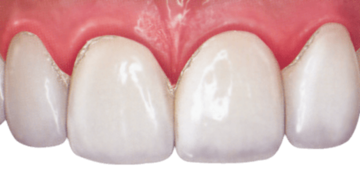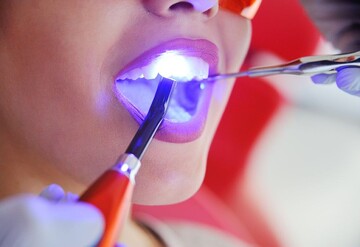Preventive
An oral exam is performed on both new and existing patients to determine their dental and health status. New patients receive a more comprehensive exam that includes x-rays and checks for gum and bone disease, systemic disorders and oral cancer. A more routine exam is done for existing patients to see if there have been any changes in health since their last visit. In order to look for gum disease, the gum tissue is measured with a small ruler to measure the pocket depth between the tooth and connective tissue. A measurement of over 4mm could indicate disease or infection. Gum disease can develop easier in deeper pockets due to the extent that plaque collects in these deep pockets. If the oral exam reveals the need for tooth scaling or root planing, these services are performed in lieu of or in addition to the routine cleaning.
Step 1 - Place bristles along the gum line at a 45 degree angle. Gently brush using a circular motion along the outer and inner tooth surfaces.
Step 2 - Brush each tooth individually. Tilt brush vertically behind the front teeth. Using the front half of the brush, use the same circular motion.
Step 3 - Place the brush against the biting surface of the teeth using a gentle back-and-forth motion. Brush the tongue to remove odor-producing bacteria.
In order to floss properly, begin by taking approximately 18 inches of floss and winding one end a few times around your middle finger. Leave approximately 6 inches of floss between your hands and wrap the opposite end of the floss around your other middle finger once. Put the floss between your thumbs and index fingers and hold tightly.
As you insert the floss between your teeth using a gentle rubbing motion, curve the floss in the shape of a C once it reaches the gum line. Move the floss up and down against the side of the tooth in a gentle manner, making sure you work the floss into the adjacent tooth before moving onto the next space. Before you move onto the next space, wind a little floss around your middle finger in order to get a new section of floss to work into your gums.
Fluoride is an important part of healthy tooth development and will help prevent cavities.
Fluoride can provide protection from tooth decay in a couple ways:
1) It helps to strengthen the tooth's enamel so it can repel the acid that is formed by plaque.
2) Teeth that have been damaged by plaque can repair and re-mineralize themselves with the help of fluoride.
Fluoride is incapable of repairing already formed cavities, but it does assist in reversing low levels of tooth decay and helps in preventing new cavities from forming.
Plaque is essentially the start of gum disease problems. Plaque is a build-up of particles from the foods you eat every day. Once sugars are introduced to plaque, it turns into a tooth eating acid that sits just above the gum line. If regular oral care isn't standard, the acid will start eating at the teeth and gums. Plaque that is allowed to sit for a prolonged period of time can cause cavities, gingivitis and other problems in your mouth. If it's left longer than that, serious dental procedures may be required to restore your decaying smile.
In order to remove plaque, tartar and calculus deposits from your teeth, a tooth scaling must occur. In some cases plaque and tartar are present below the gum line and a sub-gingival tooth scaling must occur.
Sometimes after a tooth scaling, the roots of a tooth must be planed in order to create a smooth surface for the gum tissue to re-attach to. In addition to the planing, your dentist may also prescribe medication in order to control infection and pain.




 Request an Appointment
Request an Appointment
